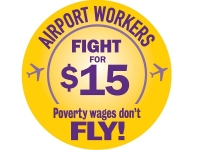Business
SEIU, New National Survey - 42 % of US Airport Workers Live Below the Poverty
Undeniable poverty crisis at US airports

(Source: SEIU)
USPA NEWS -
There's an undeniable poverty crisis at US airports: 42 % of airport workers live below the poverty line, a new survey of workers at the nation's 30 busiest hubs finds. Most of these security officers, baggage handlers, cabin cleaners, janitors, wheelchair attendants and other passenger service...
There's an undeniable poverty crisis at US airports: 42 % of airport workers live below the poverty line, a new survey of workers at the nation's 30 busiest hubs finds. Most of these security officers, baggage handlers, cabin cleaners, janitors, wheelchair attendants and other passenger service workers are parents who support households and families that depend on their income.
In contrast, the U.S. aviation industry is booming. Profits have literally taken off for airlines in recent years as commercial carriers in 2015 generated record profits of $25.6 billion and $169 billion in sales, for a combined net income margin of more than 15 %. This was the sixth consecutive year these carriers have posted after-tax profits. Despite the unprecedented industry profits, airlines have created a race to the bottom that has hammered airport staff.
Four in 10 of these workers admit to going hungry or skipping a meal, according to the survey. This sad reality has become a way of life for far too many contracted personnel and their families across the country. At a time when most Americans celebrate and are grateful for bounty, these employees often go hungry because they don't earn enough to make ends meet.
By waging massive demonstrations right after the national election, airport, fast-food and underpaid workers in other industries are showing their commitment to hold politicians of all parties accountable for their responsibility to raise pay and strengthen union rights. Now that Election Day has come and gone, they are taking to the streets“”and risking arrest“”to show that the time is now for the country's leaders and corporations to act.
Every airport worker (from ramp workers to terminal cleaners) has a role to play in keeping passengers safe and airports running smoothly. The survey found that one-third of employees have been at the airport for less than a year. Hourly wages of at least $15 and union rights will help reduce turnover and keep experienced workers (including security officers) on the job. Having a union will help all workers demand the training and equipment they need to deal with the multiple threats (from infectious disease to armed attacks) that US airports face.
The poll found that nearly half of airport workers are immigrants. US airports are microcosms of the changing country, with the majority of workers being people of color, and immigrants from Africa, the Middle East, Asia and Latin America. These men and women play a critical role in helping to keep US airports safe and secure and are often the first responders in emergency situations.
As part of the massive protests set for Nov.29, airport personnel are also taking to the streets to reject Republican calls to deport immigrants, and demand an end to structural racism and the police killings of Black people.
As part of the massive protests set for Nov.29, airport personnel are also taking to the streets to reject Republican calls to deport immigrants, and demand an end to structural racism and the police killings of Black people.
The survey also found that :
* Nearly one-fourth have received some form of government assistance;
* A majority make less than $12 an hour and report annual household income of less than $25,000;
* More than half have been on the job for less than three years;
* Women make less than their male counterparts and are disproportionately more likely to experience food insecurity.
* Nearly one-fourth have received some form of government assistance;
* A majority make less than $12 an hour and report annual household income of less than $25,000;
* More than half have been on the job for less than three years;
* Women make less than their male counterparts and are disproportionately more likely to experience food insecurity.
Airport workers have been linking arms with fast-food and other underpaid workers in the Fight for $15 movement, which has grown into a global phenomenon that includes fast-food, home care, child care, university, retail, building service and other workers across hundreds of cities and scores of countries.
Source : Service Employees International Union
Ruby BIRD
http://www.portfolio.uspa24.com/
Yasmina BEDDOU
http://www.yasmina-beddou.uspa24.com/
Source : Service Employees International Union
Ruby BIRD
http://www.portfolio.uspa24.com/
Yasmina BEDDOU
http://www.yasmina-beddou.uspa24.com/
Ruby Bird Yasmina Beddou Poverty Crisis Airports United States Us Demonstrations Handlers Skycaps Cabin Cleaners Survey Workers
Liability for this article lies with the author, who also holds the copyright. Editorial content from USPA may be quoted on other websites as long as the quote comprises no more than 5% of the entire text, is marked as such and the source is named (via hyperlink).






